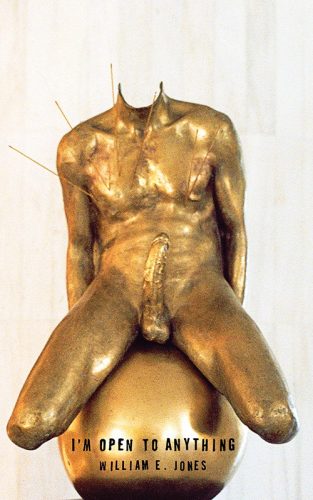‘I’m Open to Anything’ by William E. Jones

Author: Michael Kaler
May 30, 2019
Compelling and perverse, William E. Jones‘ debut novel I’m Open to Anything queers the conventions of the Midwestern bildungsroman.
Set in the eighties, the novel follows an unnamed narrator as he moves from his Midwestern hometown to Los Angeles upon his college graduation. Instead of finding friendship, romance, and deep connection, the reticent graduate spends his days alternating between working at a pornographic video store, fisting sex partners, and reflecting on erotic art and film. Laced with denunciations of America’s imperialist foreign policy, the work’s a radical departure from the typical bourgeois coming-of-age and coming out stories.
In each of the book’s fifteen chapters, the narrator recounts a different stage of his life across a series of droll vignettes, punctuated by impersonal cultural criticism and dry descriptions of lurid sex.
Raised by a perpetually intoxicated father and conservative mother in a dying industrial town during the seventies, the narrator begins, “I concentrated all of my efforts on making as decisive a break with my childhood as I could.” Little connects him during his youth to his hometown or anyone in it. The narrator’s deep-seated aversion to emotional intimacy shapes not just his life’s course but also his detached style of speech.
A gifted writer, the narrator decides to attend a university five-hundred-miles away from his parents, and he moves to Los Angeles shortly thereafter upon the advice of his closest and only confidante, a Communist determined to help topple American empire.
L.A. proves to be a mixed bag. After he finds an apartment, “a basement unit, almost a cave,” the narrator samples the local gay nightlife, but he strikes out again and again, whether he’s dealing with yuppies at Roosterfish or modern primitives at Club Fuck. He seeks solace at the New Beverly Cinema, a nearby revival house, where he befriends a ticket taker named Anne and compares many of the screened films unfavorably to the works of Rainer Werner Fassbinder and Fred Halsted.
The narrator’s encroaching sense of existential dread is helped neither by sporadic hook-ups nor a low-wage job at an independent video store, which rents gay pornography and attracts lonely-looking men. Fed up with “this life of menial work, lonely evenings, and occasional impersonal sex,” he fights his lack of purpose by starting to write “something that captured the texture of my time in Los Angeles.”
 At the same time the aspiring writer begins a casual fling with Daniel, a Salvadoran immigrant in an open relationship. He and Daniel discuss at length the worsening political climate across Latin American countries, driven by U.S.-backed coups and dictatorships. These elevated discussions are a far cry from the pair’s intense fisting, but the bond’s sustained equally by politics and sex; the many turns of the narrator’s relationship with Daniel comprise the story’s final act.
At the same time the aspiring writer begins a casual fling with Daniel, a Salvadoran immigrant in an open relationship. He and Daniel discuss at length the worsening political climate across Latin American countries, driven by U.S.-backed coups and dictatorships. These elevated discussions are a far cry from the pair’s intense fisting, but the bond’s sustained equally by politics and sex; the many turns of the narrator’s relationship with Daniel comprise the story’s final act.
The sex writing’s strange and rhythmic. The pace at which the narrator returns to sex is predictable, and he recollects only what he did and how his partner reacted, not how he himself felt. Of giving Daniel an orgasm for the first time, he merely notes, “I took a deep breath and pulled my fist out as quickly as possible. His entire body shuddered. I said nothing.” Void of emotion, but expertly cadenced, these scenes are as mesmerizing even in their detached haze.
This sense of erotic alienation is matched by the narrator’s emotionally barren but intellectually vast inner life. His friendships are few, his reactions to life muted, but he has no shortage of things to say about a wide array of cultural texts: Belgian artist James Ensor’s Doctrinal Nourishment, What Ever Happened to Baby Jane?, L.A. Plays Itself, Jean Genet’s oeuvre, and so many more films, novels, and paintings.
The work’s portrait of the time is, unsurprisingly, idiosyncratic and selective. The narrator addresses at length emerging critiques of the Western canon, Latin America’s political volatility, and trends in gay porn, but the AIDS epidemic is mentioned infrequently and from an observer’s perspective. What affects the narrator is detailed, what doesn’t is sidelined.
Jones takes as his starting point the well-worn premise of the young gay man from a backwards town who moves to the big city, and then subverts every expected plot beat. After the narrator makes his much-anticipated move, he stays on the margins of his new home’s gay community. In centering non-normative experience, and bringing issues of class, race, and global politics to the forefront, the novel offers a fresh, socially conscious take on an over-told story that typically revolves around self-transformation.
“I knew I had no ability to make a grand statement,” the narrator admits of his first attempts at writing in the late eighties, “but I also knew I had something to say.” I’m Open to Anything runs away from any claim to representing the era’s zeitgeist, but Jones is a talented prose stylist and sharp cultural commentator whose debut is well worth reading.
I’m Open to Anything
By William E. Jones
We Heard You Like Books
Paperback, 9780996421898, 169 pp.
March 2019

